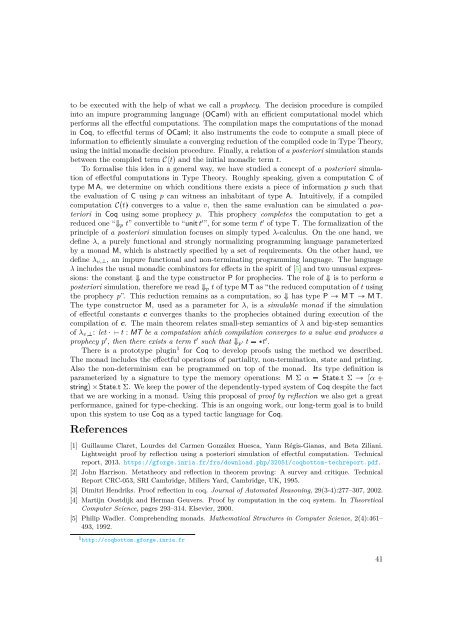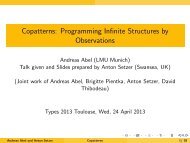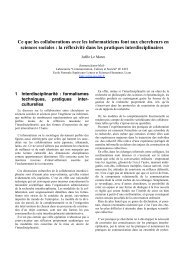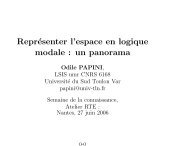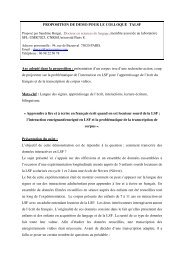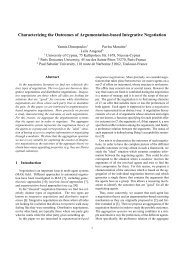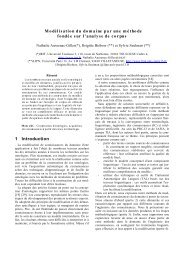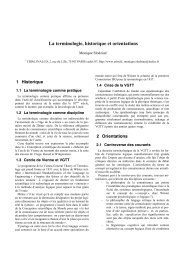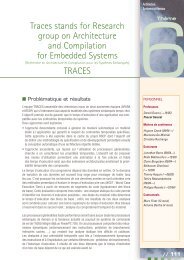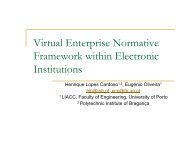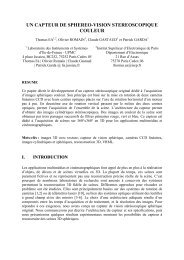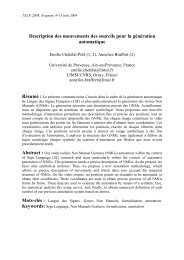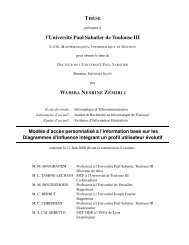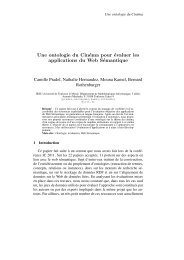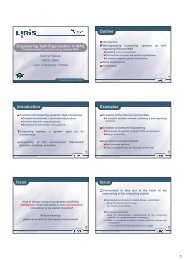Book of Abstracts - IRIT
Book of Abstracts - IRIT
Book of Abstracts - IRIT
You also want an ePaper? Increase the reach of your titles
YUMPU automatically turns print PDFs into web optimized ePapers that Google loves.
to be executed with the help <strong>of</strong> what we call a prophecy. The decision procedure is compiled<br />
into an impure programming language (OCaml) with an efficient computational model which<br />
performs all the effectful computations. The compilation maps the computations <strong>of</strong> the monad<br />
in Coq, to effectful terms <strong>of</strong> OCaml; it also instruments the code to compute a small piece <strong>of</strong><br />
information to efficiently simulate a converging reduction <strong>of</strong> the compiled code in Type Theory,<br />
using the initial monadic decision procedure. Finally, a relation <strong>of</strong> a posteriori simulation stands<br />
between the compiled term Cptq and the initial monadic term t.<br />
To formalise this idea in a general way, we have studied a concept <strong>of</strong> a posteriori simulation<br />
<strong>of</strong> effectful computations in Type Theory. Roughly speaking, given a computation C <strong>of</strong><br />
type M A, we determine on which conditions there exists a piece <strong>of</strong> information p such that<br />
the evaluation <strong>of</strong> C using p can witness an inhabitant <strong>of</strong> type A. Intuitively, if a compiled<br />
computation Cptq converges to a value v, then the same evaluation can be simulated a posteriori<br />
in Coq using some prophecy p. This prophecy completes the computation to get a<br />
reduced one “ó p t” convertible to “unit t 1 ”, for some term t 1 <strong>of</strong> type T. The formalization <strong>of</strong> the<br />
principle <strong>of</strong> a posteriori simulation focuses on simply typed λ-calculus. On the one hand, we<br />
define λ, a purely functional and strongly normalizing programming language parameterized<br />
by a monad M, which is abstractly specified by a set <strong>of</strong> requirements. On the other hand, we<br />
define λ v,K, an impure functional and non-terminating programming language. The language<br />
λ includes the usual monadic combinators for effects in the spirit <strong>of</strong> [5] and two unusual expressions:<br />
the constant ó and the type constructor P for prophecies. The role <strong>of</strong> ó is to perform a<br />
posteriori simulation, therefore we read ó p t <strong>of</strong> type M T as “the reduced computation <strong>of</strong> t using<br />
the prophecy p”. This reduction remains as a computation, so ó has type P Ñ M T Ñ M T.<br />
The type constructor M, used as a parameter for λ, is a simulable monad if the simulation<br />
<strong>of</strong> effectful constants c converges thanks to the prophecies obtained during execution <strong>of</strong> the<br />
compilation <strong>of</strong> c. The main theorem relates small-step semantics <strong>of</strong> λ and big-step semantics<br />
<strong>of</strong> λ v,K: let ¤ $ t : MT be a computation which compilation converges to a value and produces a<br />
prophecy p 1 , then there exists a term t 1 such that ó p<br />
1 t t 1 .<br />
There is a prototype plugin 1 for Coq to develop pro<strong>of</strong>s using the method we described.<br />
The monad includes the effectful operations <strong>of</strong> partiality, non-termination, state and printing.<br />
Also the non-determinism can be programmed on top <strong>of</strong> the monad. Its type definition is<br />
parameterized by a signature to type the memory operations: M Σ α State.t Σ Ñ pα<br />
stringq ¢ State.t Σ. We keep the power <strong>of</strong> the dependently-typed system <strong>of</strong> Coq despite the fact<br />
that we are working in a monad. Using this proposal <strong>of</strong> pro<strong>of</strong> by reflection we also get a great<br />
performance, gained for type-checking. This is an ongoing work, our long-term goal is to build<br />
upon this system to use Coq as a typed tactic language for Coq.<br />
References<br />
[1] Guillaume Claret, Lourdes del Carmen González Huesca, Yann Régis-Gianas, and Beta Ziliani.<br />
Lightweight pro<strong>of</strong> by reflection using a posteriori simulation <strong>of</strong> effectful computation. Technical<br />
report, 2013. https://gforge.inria.fr/frs/download.php/32051/coqbottom-techreport.pdf.<br />
[2] John Harrison. Metatheory and reflection in theorem proving: A survey and critique. Technical<br />
Report CRC-053, SRI Cambridge, Millers Yard, Cambridge, UK, 1995.<br />
[3] Dimitri Hendriks. Pro<strong>of</strong> reflection in coq. Journal <strong>of</strong> Automated Reasoning, 29(3-4):277–307, 2002.<br />
[4] Martijn Oostdijk and Herman Geuvers. Pro<strong>of</strong> by computation in the coq system. In Theoretical<br />
Computer Science, pages 293–314. Elsevier, 2000.<br />
[5] Philip Wadler. Comprehending monads. Mathematical Structures in Computer Science, 2(4):461–<br />
493, 1992.<br />
1 http://coqbottom.gforge.inria.fr<br />
41


